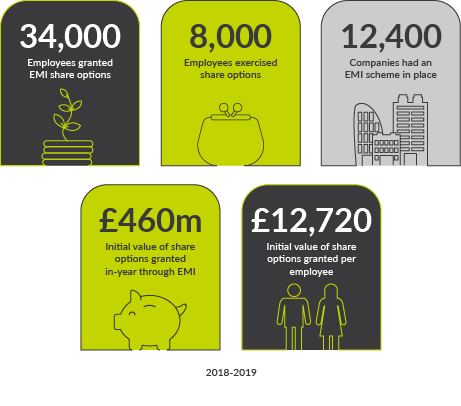Is the time right to implement an Employee Share Option Scheme for your business?

As the recruitment of top talent at innovative SME businesses becomes increasingly competitive, businesses are seeking ways they can attract, incentivise and retain professionals – particularly one which encourages long-term loyalty. One such way is to offer a share option scheme backed by HMRC. There are lots of different share schemes in existence (such as Company Share Option Schemes and SIPS), but by far the most popular and the most beneficial to companies and employees is the Enterprise Management Incentives (EMI) scheme.
To coincide with the February 2021 Budget, the Government announced a Call for Evidence into the workings of the EMI share option regime, to ensure it provides sufficient support for high-growth companies to recruit and retain the best talent and scale up effectively. Crucially, the Call for Evidence will also examine whether even more companies than are presently permitted to access the EMI scheme should be allowed to avail in future – those larger companies with gross assets in excess of £30 million or with more than 250 employees, or some smaller companies that have been regarded as “disqualified” because of their sector or trading activity.
In light of the Government’s review, is now the time for you to consider the benefits of an EMI scheme for your business? This article will outline the key attributes of an EMI scheme and the benefits of setting one up.
What makes EMI schemes attractive to SME businesses?
- As a ‘discretionary’ scheme, EMI options can be offered to any individual employees at the discretion of the employer, meaning business owners can be selective (without being unjustly discriminatory).
- An employer may grant qualifying share options up to a value of £250,000 per employee in a three-year period.
- Upon exercise of EMI options, both the employer and employee benefit from fantastic tax breaks.
- For the employer, in addition to potentially not paying employer National Insurance Contributions (NICs) (compared to other forms of remuneration), your company may receive a corporate tax deduction when shares are acquired under the EMI option for the gain that the employee makes at that point.
- For the employee, if EMI options are granted at market value, he or she pays no income tax or no NICs on any increase in share values between the date the options were granted and the date the options were exercised.
- Once options have been exercised, the gains arising from sale of the shares may be subject to lower Capital Gains Tax (CGT) (lower, when compared to the employee’s income tax rate).
- And on top of that, some employees may be eligible for an even lower CGT rate through the old Entrepreneurs’ Relief (now Business Asset Disposal Relief (BADR)) – but only if there is a period of two years between the date an option was granted and the disposal date of the shares (which will be the case for the vast majority!).
Who qualifies for an EMI scheme at present and has the bar been set too high?
To qualify, a company must:
- be an independent trading company
- have less than £30 million in gross assets
- have less than the equivalent of 250 full-time employees
- carry out a qualifying trade (excluded activities include banking, farming, property development, provision of legal services, and shipbuilding – these will be reconsidered by the Government in its Call for Evidence)
- have a permanent establishment in the UK.
A timeline of change – and where are we now in 2021?
- In 2002, the gross assets limit for eligible companies increased from £15 million to £30 million and the previous employee limits were removed.
- In 2008, EMI was restricted to companies with fewer than 250 employees to improve its targeting.
- In 2008, the individual employee share option limit was increased to £120,000.
- In 2012, this was increased again to £250,000 as part of a package of measures to expand EMI. This included the extension of Entrepreneurs’ Relief (now Business Asset Disposal Relief) to shares acquired through EMI.
- In 2020, the Government reduced the lifetime limit for Business Asset Disposal Relief (BADR) from £10 million to £1 million, including for qualifying gains realised through EMI.
As the graphic and table below demonstrate, EMI share options are certainly popular according to the latest tracked official statistics.

The Rise and Rise of EMI Share Schemes in Numbers

Could EMI Share Schemes become even more popular in future
Yes – undoubtedly so. If the Government decides to widen the scheme to include additional types and sizes of company, particularly those with previously restricted “trading activities”, then there could be an avalanche of additional companies availing of these tax-advantaged employee incentives.
Call for Evidence – have your say!
Out of the Government’s 18 core question in its Call for Evidence, the following are particularly important in the context of understanding the current barriers to EMI eligibility and removing those barriers in future:
Question 3. If your business does not qualify for EMI, are you using any other tax-advantaged employee share scheme?
Question 16. In your view, should the EMI scheme criteria be extended to include more companies? Please explain your answer. If your answer is yes, which eligibility criteria would you change and why?
Question 18. In your view could widening the current eligibility criteria to support larger companies affect smaller companies’ ability to recruit and retain employees? Please explain your answer.
If you are considering a Share Option Scheme for your company, or if you are considering other ways to allot, issue, or transfer shares to employees, please contact JP Irvine, Partner at Keystone Law, who will be delighted to help you.
